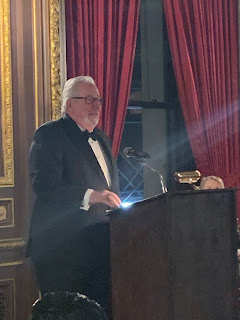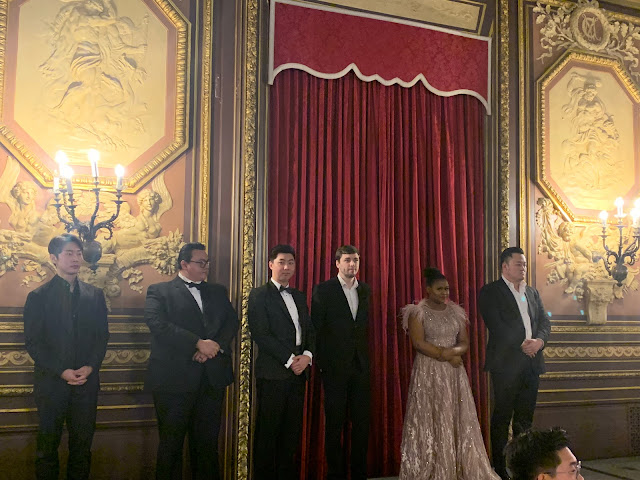Sophia Hunt, Arlene Shrut, Vladyslav Buialskyi, Jazmine Saunders, Korin Thomas-Smith,
Alice Chung, Joseph Parrish, Erik Grendahl, and Shaina Martinez
It was a sensational recital of gifted young singers; it was a gathering of the citizens of Planet Opera, generously open to one and all; it was a celebration of the enduring legacy of Gerda Lissner; it was a memorial to the late Scott Barnes. Everyone left Zankel Hall grinning broadly. No one need worry about the future of opera.
If you care who won which prize, we direct you to www.gerdalissner.org where you can also read all about the good work of the foundation. We prefer to use our space to write about the winners who were winnowed from a huge group of applicants. We are always happy to see WQXR's renowned Midge Woolsey hosting such events and equally happy to enjoy the versatile accompaniment of pianist Arlene Shrut. We acknowledge the cooperation of the Liederkranz Foundation.
And now...on with the show! What a brilliant idea to open the program with the winner of the Zarzuela Division, the scintillating soprano Shaina Martinez, known to us since her days at Manhattan School of Music. We were overjoyed to learn that the foundation established a platform for honoring this very special art form; and who better to fulfill the mission than Ms. Martinez whose perfect Spanish flowed effortlessly and permitted her to inhabit the role of Cecilia Valdés from Gonzalo Roig's zarzuela of the same name.
The spirited entrance aria, illuminated by meaningful gestures, served to introduce the character, a mulatto woman who is unaware that her suitor is her half-brother, both fathered by a slave trader; he is legitimate, she is not. Two centuries ago, such stories were common in the New World, particularly in Cuba with its complicated racial hierarchy. We tell you such details, dear Reader, because we want you to share our appreciation of what was going on in our own hemisphere whilst Verdi was writing his operas in Italy.
Ms. Martinez' second selection was a tragic lullabye "Hija del Amor" in which the character's mood has changed to sorrow and tenderness, illustrated by the minor mode in which it is written and the artist's facility with heart-rending legato. We felt totally involved in the singer's facility for storytelling. She truly inhabited the character without compromising her exquisite voice.
Next we heard winners from the Lieder Division. Baritone Erik Grendahl's two selections were quite different. Georgy Viridov's "The Virgin in the City" was given a quiet reading with minimal gesture and a sweet lyrical sound. The artist came to vibrant life in Debussy's "Ballade des femmes de Paris", in which the text has something to say about women from several different countries. Mr. Grendahl, remembered from his performances at the Santa Fe Opera, made the French very clear and told the tale with panache.
Mezzo-soprano Alice Chung is an equally fine storyteller and who doesn't love William Bolcom's "George", the tale of a colorful character who comes to a tragic and ironic end. When a singer's technique is as admirable as Ms. Chung's one tends to ignore it in favor of the stagecraft and presentation. We hung on her every word. Happily, she followed this with Choi Young-Sup's "Longing for GeumGang Mountain" which we heard her sing at WQXR's Green Room. In our review of that recital, we discussed the newness of the Korean art song tradition and the reasons for it. We would say Korea got off to a great start in this setting of Han Sang-eok's text.
Bass-baritone Joseph Parrish has been on our radar for quite some time, also having made a fine showing at the Santa Fe Opera. What a departure from the expected to have a singer accompany himself at the piano in a contemporary piece! Bob Telson wrote "Calling You" for the film Bagdad Cafe which we have never seen; Mr. Parrish's performance made us want to see the film.
On more familiar territory, we heard the frisky "Fussreise" from Wolf's Mörike Lieder. We find this to be one of Wolf's more accessible lieder and enjoyed Mr. Parrish's fine command of German and his immersion in the spirit of the song. We also enjoyed Ms. Schrut's varied coloration of the strophic composition. He closed the set with Tchaikovsky's "Sred shumnogo bala", sung with fine Russian and intense reflection.
The second part of the concert took us into operatic territory. Korin Thomas-
Smith employed his fine baritone to sing Tarquinius' aria "Within this frail crucible of light". His technique was impressive but we wanted him to show more of Tarquinius' character. He had no problem showing us the Count's character in "Hai già vinta la causa" from Mozart's Le Nozze di Figaro. His aptitude for demonstrating the complexity of the Count's emotions was impressive. He is angry, vengeful, competitive, and bewildered, all at the same time. This is so much more interesting than the one-note interpretations we often hear.
Soprano Jazmine Saunders has a sizable instrument which she put to great use in arias by Mozart and Verdi. Her vibrato is distinctive and emotionally affecting. Poor Pamina must arouse our sympathy in "Ach, ich fühl's" from Mozart's Die Zauberflöte as she frets about her love interest who is actually true. By comparison, Gilda is confident and enamored in Verdi's Rigoletto, not knowing that she has been woefully deceived. Both characters were given their due with the voice sustained throughout the register. Mozart gives Pamina long legato lines and Verdi gives Gilda wild leaps and breathless staccato passages. Both perfomances were memorable.
Bass-baritone Vladyslav Buialskyi chose well, illuminating the character of Figaro who mourns what he thinks is Susana's infidelity in "Aprite un po' quegli occhi". He is shocked; he is angry; rather than despairing he decides to give warning to other men. We in the audience know better; Susana adores him and is conniving to make their marriage work out. It's a great moment in Nozze di Figaro! We particularly enjoyed the rapid patter.
The second selection was "Si, morir ella de!" from Ponchielli's La Gioconda, sung by the vengeful Inquisitor Alvise. Although we believe the role was written for a bass, the extensive passages in the lower register were no challenge for Mr. Buialskyi's powerful instrument and the aria provided an opportunity to color his voice differently.
The final singer was soprano Sophia Hunt who also wisely selected two arias that showed her versatility. The eponymous Arabella from the Strauss opera has reached a point of forgiveness and acceptance in "Das war sehr gut, Mandryka". The Countess in Nozze di Figaro, on the other hand, is aware of having lost the love of the Count who had pursued her so relentlessly and sings of her despair in "Dove sono". Two very different characters were brought to life such that the entire scenes appeared before our mind's eye. We loved the rich texture of Ms. Hunt's voice and the varied colors. The Countess was particularly well realized and we heard a hint of optimism in the second verse.
As Ms. Woolsey pointed out, we almost had the entire Nozze di Figaro onstage. Yes, it was a great treat to hear so many selections from one of our favorite operas. The evening ended with the entire group joining forces for "You'll Never Walk Alone" from Rogers and Hammerstein's Carousel.
What popped into our mind just now is "This Was a Real Nice Clambake" Concert.
© meche kroop



